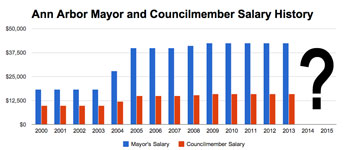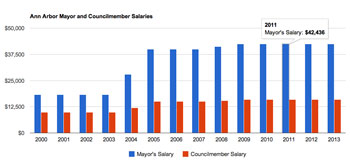Editor’s note: At a mid-December 2010 film premiere in Ann Arbor, Kirk Westphal unveiled two of his latest works. The second of them he described as suitable for “true wonks” – “The Council-Manager Form of Local Government.” The movie is an introduction to how the council-manager system is different from a strong mayor system. The city of Ann Arbor uses a modified version of the council-manager form. One issue that arises in the film is cost: How do the two systems compare with respect to compensation?
In this article, The Chronicle takes a look at some of the recent history of compensation for Ann Arbor’s mayor and city councilmembers. The context for this reflection also stems in part from the fact that 2011, as an odd-numbered year, will be an occasion on which mayor and councilmember salaries are re-evaluated for 2012 and 2013.
As a minor part of his 2010 campaign for a Ward 5 city council seat, Newcombe Clark promised that if elected he would donate to charity the annual councilmember salary of $15,913. At a Main Street Area Association candidate forum, Clark gave this rationale for his promised salary donation: Negotiations with the city’s labor unions would be difficult, if councilmembers were collecting “a single dime” for something they should do on a volunteer basis.
For most Ward 5 voters, Clark’s promise and its premise were not a deciding factor, and Democrat Carsten Hohnke was re-elected on Nov. 2 to a second two-year term with 69% of the vote. The remaining 31% of the vote was split – 22% for Republican John Floyd and 9% for the independent Clark.
Still, based on last year’s city council budget discussions, current city councilmembers recognize that their own compensation is part of the relevant context for any financial sacrifices they might request of others. Last year, a council request for sacrifice came as the city was negotiating with the firefighters union to prevent layoffs, and as the council requested a reduction in non-union staff compensation by 3%. In that context, some councilmembers, including the mayor, announced a voluntary 3% salary giveback of their own. For councilmembers, that meant writing a $477 check, while for the mayor it represented $1,273. [The mayor's salary for 2010 is $42,436.]
So as the city council enters its budget planning phase for fiscal year 2012, compensation levels – for non-union and union labor alike, as well as for elected city officials – could become one focus of the conversation. That’s especially true, given that FY 2012 is the first year of a two-year budget planning cycle. Even though the council approves each year’s budget separately every May – for the fiscal year beginning July 1 – the planning takes place in two-year cycles. And it’s the first year of the planning cycle when the context is set for the second year.
Compensation for councilmembers and the mayor is also set on a two-year cycle, and 2011 will be a calendar year when a decision could be made to change their salaries. The every-odd-year session of the local officers compensation commission (LOCC) – the body that sets council and mayoral salaries – is prescribed by the state enabling statute on which the city’s LOCC ordinance is based.
With the LOCC scheduled to meet sometime in 2011, and with two current vacancies on the seven-member body, it’s a suitable time to reflect on: (1) the history of the LOCC’s recommendations over the last decade; (2) the rationale behind those recommendations; and (3) the way that expectations of the mayor and councilmembers have been implicitly defined through those recommendations. [Full Story]





